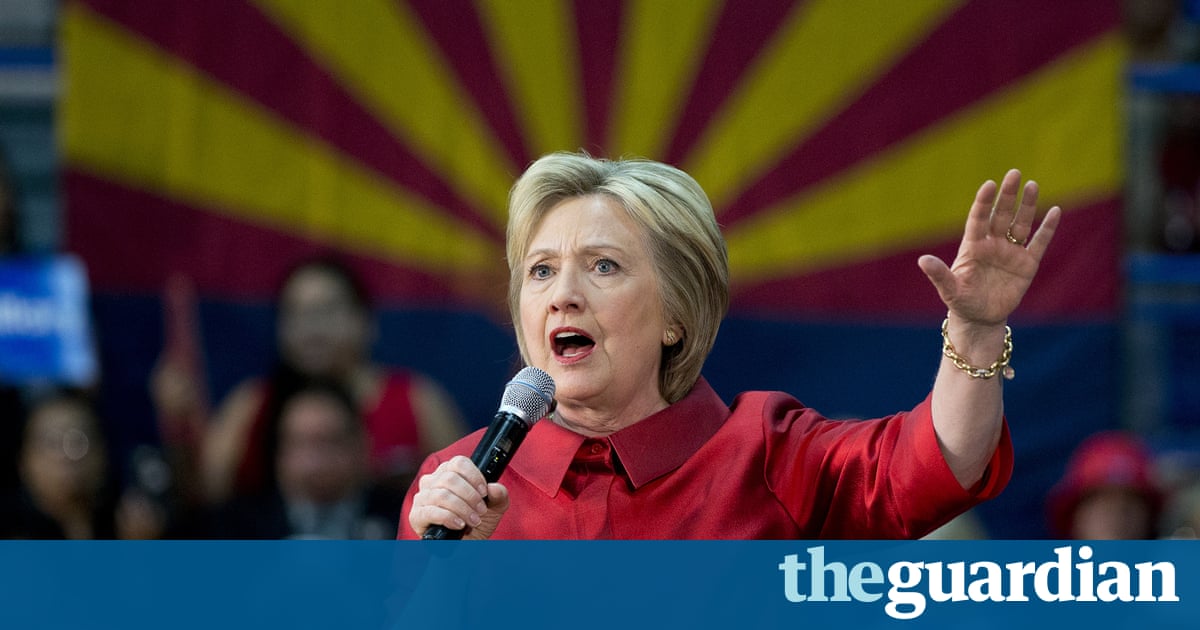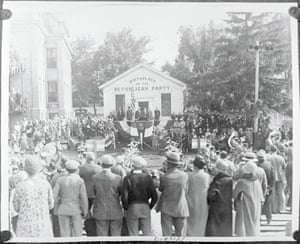Wisconsin and Arizona offer tempting prizes to Trump and Clinton

Amid a bitter split between the cities and provinces of America, the Republican and the Democrat are each pushing hard in the others backyard

As millions nervously refresh polling websites to assess Donald Trumps chances of catching Hillary Clinton on Tuesday, it can be a shock to see how much of the election map is already coloured red. But while the sight of large Republican swaths easily exaggerates the partys likely share of voters, it also highlights another, more meaningful, trend.
Of the many dividing lines in this bitterly fought election race, gender, education few are as stark as that between metropolitan America and its less densely populated suburbs, towns and countryside. The reason Clintons islands of blue look so small, particularly in county level maps, is that her supporters are clustered together in large, cosmopolitan and overwhelmingly Democratic cities. More than most Republicans, Trump appeals to those in the rest of the country who view such urban populations with disdain.
It is most obvious when comparing coastal enclaves like New York with conservative flyover territory such as Kansas. But what is more interesting is to contrast two inland states that are on the target list for each party to flip to look at a small town and a big city at opposite ends of the metropolitan-provincial divide:
Ripon, Wisconsin
The state of Wisconsin is an ambitious target for Republicans. Reliably Democratic in eight of the last 10 presidential elections, it nonetheless feels a long way from Washington DC or Clintons Brooklyn campaign headquarters.
Employment is not the problem in what still feels a relatively prosperous part of the midwest. As Fridays national jobs report showed, finding work is less and less of a challenge. What are harder to come by are jobs that pay well. While the cost of living has traditionally been lower in places like Ripon, voters face the same soaring bills for essentials such as healthcare and college tuition.
In the Democratic primary, Wisconsin was one of the 22 states that rejected Clinton in favour of Bernie Sanders. Unusually, voters were also wary of Trump. His campaign is hoping to change that on Tuesday.
In Ripon, a small town about an hour or so north of the state capital, there is a small 19th-century schoolroom that underlines just how far the Republican party will have come if Trump does pull off a surprise win here on Tuesday.
On a chilly night in March 1854, several dozen local residents came together at the schoolroom to found the Republican party. Unlike the Democratic or Whig parties, this was a movement deliberately started outside Washington to stand up for the common man and, most strikingly in the context of a 2016 campaign which has been accused of racism, to stop the spread of slavery.
The current Republican party is considerably different to how it originated, says Jason Mansmith, director of Ripons chamber of commerce, which looks after the Little White School House. Back then, the party was more progressive than it was conservative.
Whether Mansmiths remarks represent an anti-establishment grassroots spirit that a wealthy New York businessman such as Trump is capable of rekindling remains to be seen.
Clinton has not visited the state since April, but as polls have tightened in recent days, particularly in a crucial Senate race, Democrats have sprung into action, eager to shore up a crucial component of their so-called firewall strategy to block Trump from the 270 electoral college votes he needs to take the White House.

Last weekend, the Clinton campaign started to air TV commercials in Wisconsin. On Tuesday, Clintons running mate, Tim Kaine, was sent to Madison to campaign. He returns on Sunday for events in Milwaukee, Green Bay and La Crosse. Joe Biden, the vice-president, was in Madison on Friday, telling supporters: We have to win Wisconsin, and we will with Russ [Feingold, the Democratic Senate candidate] leading the way.
One poll had Trump cutting Clintons lead to just two points, but an eagerly anticipated survey on Tuesday suggested it would still be a tough slog for Republicans to take back their birthplace.
Instead, Democrats are worried that former senator Russ Feingolds chances of winning back his seat from Ron Johnson in the Senate race appear to be slipping away. Sanders rushed out an alert to supporters: Dire news from Wisconsin. A poll released this afternoon has Russ Feingold only up by one point meaning hes in a virtual tie. This is too close.
Clintons director of state campaigns, Marlon Marshall, drew solace from early voting data which suggests Democratic strongholds are outvoting Republican counties in suburban Milwaukee by two to one.
For Trump, the hope is that traditional boundaries blur as the provinces rise against Washington. If you try to apply conventional political wisdom to Donald Trump you lose every time, said his campaign manager, Kellyanne Conway, this week. Michigan and Wisconsin have been elusive to Republican candidates, but his message on illegal immigration, trade and jobs, and patriotism is different.
Phoenix, Arizona
Just as winning Wisconsin on Tuesday would mean Trump was having a very good night, a win in Clinton Arizona would point to a huge victory for the Democrat.
The desert state has voted for a Republican president in nine of the last 10 elections making it an even more uphill struggle on paper for Democrats than Trump faces in Wisconsin. Unlike there, the Senate race has not flipped back and forth between parties but is dominated by a Republican incumbent, John McCain, who has represented the state for three decades.
But Arizona, and in particular its largest city, Phoenix, is changing fast an emblem of the modern and metropolitan America to which Clinton hopes to appeal. This sprawling desert metropolis is in many ways a rebuke to everything that Trump says is wrong with the country. Though it was hit hard by a property boom that turned to bust during the banking crisis, it has a modern and diverse economy and an even more diverse workforce swollen by internal and external immigration, as workers move from the rust belt to the sun belt and the population steadily becomes more Hispanic.
The states other Republican senator, Jeff Flake, was one of the first to distance himself from Trumps divisive rhetoric on immigration. McCain himself was to flip-flop over endorsing Trump as he sought to win a difficult nomination battle before pivoting to a much more diverse general electorate.
On Thursday, at a community centre in Phoenix, Kaine gave a speech entirely in Spanish. Michelle Obama and Chelsea Clinton have visited and Sanders is also being dispatched to help, campaigning in Phoenix on Sunday.
According to aides, he intends to address Clintons plans to build an economy that works for everyone, not just those at the top, and Donald Trumps plans, which would benefit himself and other millionaires and billionaires like him.
Sanders will say: Lets raise the minimum wage to a living wage, lets make public colleges and universities tuition-free, lets end a broken criminal justice system, and lets defeat Trump and make Clinton our next president.
The candidate herself was here on Tuesday. In many ways, Arizona is the sole survivor of a so-called expansion strategy that saw her target vulnerable Republican states like Arizona, Georgia and Utah when her national lead over Trump looked more robust. The policy had to be scaled back when Trump looked more of a threat again back east in the rust belt, but cities like Phoenix and Atlanta remain a big future hope for Democrats.
Arizona aint an indulgence, said campaign spokesman Brian Fallon. Its a true battleground. Perhaps even more favourable-looking right now than some other places weve been on TV.
If Clinton wins here, it would not only signal that Trumps presidential hopes were over, but that the Democrats were right to favour the demographics of the new America over the grievances of the old.
Read more: https://www.theguardian.com/us-news/2016/nov/05/wisconsin-arizona-2016-election-polls-trump-clinton